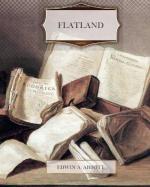|
This section contains 8,914 words (approx. 30 pages at 300 words per page) |

|
SOURCE: Smith, Jonathan, Lawrence I. Berkove, and Gerald Baker. “A Grammar of Dissent: Flatland, Newman, and the Theology of Probability.” Victorian Studies 39, no. 2 (winter 1996): 129-50.
In the following essay, Smith, Berkove, and Baker explore Abbott's interest in the writings of John Henry Newman and Bishop Joseph Butler and their theories of analogical and probabilistic reasoning.
In Philomythus (1891), his belated attack on John Henry Newman's Essay on Ecclesiastical Miracles (1843), Edwin Abbott rejects Newman's claim that accounts of miracles do not require legal proofs: “here faith has no place,” writes Abbott, “and ‘legal proof’ is the best possible proof; and if you cannot get it, you ought to try at least to get something as much like it as possible” (90). In place of Newman's principle of “antecedent probability”—that ecclesiastical miracles should be presumed true on the basis of their Biblical predecessors—Abbott offers a diametrically opposite principle:
[P]eople...
|
This section contains 8,914 words (approx. 30 pages at 300 words per page) |

|


